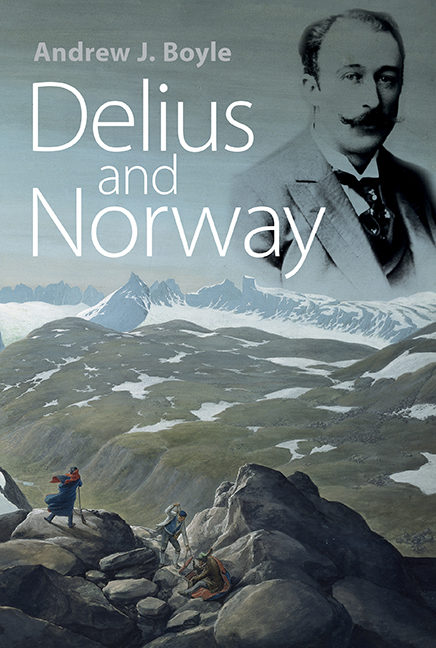Book contents
- Frontmatter
- Dedication
- Contents
- List of illustrations and tables
- Preface
- Abbreviations
- Selected glossary of landscape terms used in place names
- 1 Norway's awakening
- 2 1862–1888: Bradford, Florida and Leipzig
- 3 1888–1889: With Grieg on the heights
- 4 1890–1891: ‘C'est de la Norderie’
- 5 1892–1895: Norway lost
- 6 1896: Norway regained
- 7 1897: Front page news
- 8 1898–1902: Unshakeable self-belief
- 9 1903–1907: Breakthrough in Germany and England
- 10 1908–1912: Changes of direction
- 11 1912–1918: High hills, dark forests
- 12 1919–1934: Myth and reality in Lesjaskog
- Appendix I List of visits to Norway
- Appendix II Works with Norwegian and Danish texts and associations
- Selected bibliography and archival sources
- Index
12 - 1919–1934: Myth and reality in Lesjaskog
Published online by Cambridge University Press: 30 August 2017
- Frontmatter
- Dedication
- Contents
- List of illustrations and tables
- Preface
- Abbreviations
- Selected glossary of landscape terms used in place names
- 1 Norway's awakening
- 2 1862–1888: Bradford, Florida and Leipzig
- 3 1888–1889: With Grieg on the heights
- 4 1890–1891: ‘C'est de la Norderie’
- 5 1892–1895: Norway lost
- 6 1896: Norway regained
- 7 1897: Front page news
- 8 1898–1902: Unshakeable self-belief
- 9 1903–1907: Breakthrough in Germany and England
- 10 1908–1912: Changes of direction
- 11 1912–1918: High hills, dark forests
- 12 1919–1934: Myth and reality in Lesjaskog
- Appendix I List of visits to Norway
- Appendix II Works with Norwegian and Danish texts and associations
- Selected bibliography and archival sources
- Index
Summary
‘At last we are here in Norway – the land of Fred's constant longing’
Letter from Jelka Delius to Marie Clews, 18 August 1919Prior to 1919, Delius had been to Norway sixteen times, but only once in consecutive summers (1898 and 1899). From 1919 to 1923, however, he and Jelka spent four of the five summers in the country, the last three of them in Lesjaskog, first planning for, then enjoying a secluded life in their own cottage. The story of these visits becomes gradually less and less about ‘light summer nights & all the poetry & melancholy of the Northern summer’, and more about the rapid deterioration in Delius's health. With the advance of his disease and paralysis, many admirable and attractive traits of Delius's personality were curtailed, ‘collateral damage’ in his battle to preserve the innermost core of himself. The commentators who got to know the composer in this period have left us some of the best known and, unfortunately, prevailing descriptions of him as an abrasive and difficult individualist. Before embarking on these years, then, it would be timely to quote from some of the many people who, prior to his illness, were irresistibly drawn towards his light.
Percy Grainger, composer
Delius, as I knew him, was remarkable for his gracious and graceful companionship, for the gaiety and lightness of his moods, for his good-humoured delight in fair and open-minded argument, for his unfailingly humane outlook on world affairs.
Thomas Beecham, conductor
[There] was nothing in Delius of that vague indetermination associated traditionally with musical genius; in practical affairs he was as hardhearted as any to be found in his native county, and his knowledge of the world, both men and women, was searching and profound. He was sceptical and cynical where the majority of people were concerned, and he never wasted a word of sympathy or encouragement on those who in his opinion were not deadly in earnest over their job. But he was frank and cordial with the few he really cared for, and in general company he loved passionately to engage in highly controversial discussions on every subject imaginable.
Clare Delius, sister
His sense of humour was highly developed and his laugh was infectious. He was entirely devoid of mannerisms, and when he took the call at the St.
- Type
- Chapter
- Information
- Delius and Norway , pp. 282 - 306Publisher: Boydell & BrewerPrint publication year: 2017

